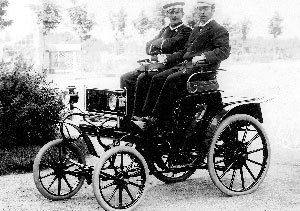On Monday of this week, German Prime Minister Angela Merkel met with President Obama in Washington and then addressed the US Congress, where she was warmly greeted, and made an impassioned address concerning the environment and global warming.
She was on top of the world when, just minutes later, she heard the news that General Motors had decided call off the sale of their European division headquartered in Germany, Opel.
And GM being GM, the company announced Wednesday that it will cut 10,000 jobs at Opel and their British division, Vauxhall, un-employing about 20% of the company's 50,000 workers.
Opel's GT was one of the first Opel vehicles sold in America; some compared it to a "mini-Corvette"
And boy, is Merkel pissed. She might not be making more warm and fuzzy speeches to Congress anytime soon. And European Union members share her feelings. Unions are all-powerful in Europe, and GM dropping the sale and the resultant job losses could wind up looking like a huge defeat for Germany and the entire EU at the hands of a recently bankrupt worldwide corporation.
In Europe's semi-socialist societies, people expect to train for good jobs, get good jobs and then keep those good jobs with benefits which would give a heart attack to the average Harvard-trained bean counter in this country. And they expect their governments to protect their rights ... and their jobs. For years, union members have been on the boards of directors of most large companies.
The sale would have needed approval from the Germans and the EU; apparently GM has had enough of dealing with national (and continental) governments and they cited the costs involved in the sale and the necessary waits for permissions from Euro entities as some of the reasons for their decision.
Opel started making cars in 1899; here's one of their first models
John Smith (wonder what name he uses when he checks into a hotel?), GM's group vice president for corporate planning and alliances, said other considerations in the cancellation were GM's and Opel's improved cash conditions.
The new Opel GT served as the basis for the Pontiac Solstice and Saturn Sky
The plan for GM was to sell Opel to a consortium led by gigantic Canadian auto parts-maker Magna International which would be bankrolled by a Russian bank, Sberbank; the bank and Magna would each get 27.5% of the company, GM would keep 35% and the employees would own 10%. Ironically, Magna may get more work orders from GM because they're keeping Opel.
The sales cancellation move came as a shock to almost everyone in the worldwide auto business. Insider consensus was that GM would sell Opel as they've planned to for the past seven months, a move which would have infused many, many needed millions into GM's shaky coffers.
Canceling the sale is actually going to cost GM. They have to pay back a $2.3 billion bridge loan from the German government (meant to keep Opel open, up and running during the sales process) which they've already been paying back, but they still owe the Germans some $1.4 billion. GM plans to incur about $4.4 billion in restructuring expenses because of their decision to cancel Opel's sale.